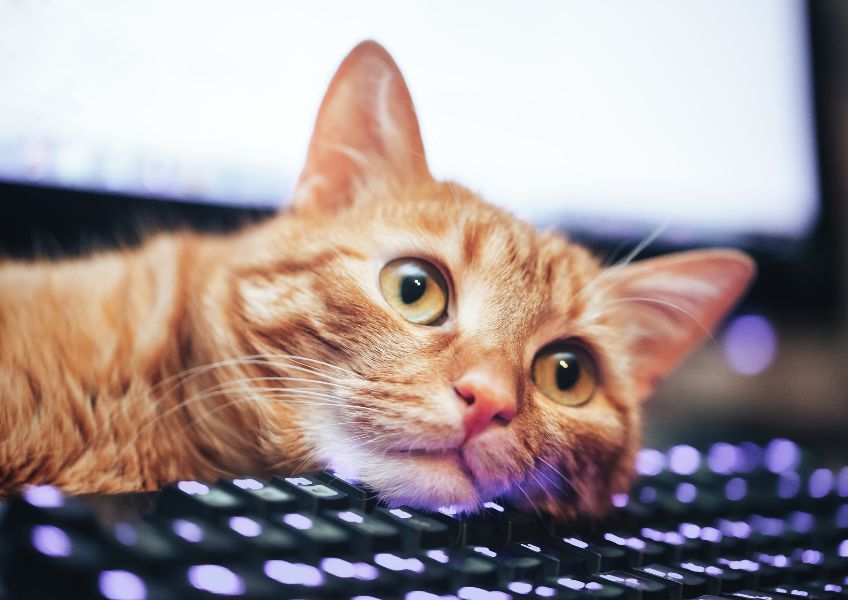There’s a point in the early or mid-afternoon when many people experience a dramatic drop in energy levels. This is natural, but unfortunately, the work structure isn’t built for an early afternoon nap, so we have to find other ways to stay alert. While struggling to stay awake is not so unusual, regularly falling asleep at your desk or always needing a nap in the middle of the day may be indicative of a health condition and you should consult a doctor. Below you’ll find a few tips for to help you stay awake when you start falling asleep at work.
1. Sleep Enough
If your body is crying out for sleep in the middle of the day, it’s possible that you aren’t getting enough sleep at night. You wouldn’t start a road trip with a half empty gas tank that won’t get you to the next gas station, so why would you start your day with your sleep tank only half full when bedtime is too far away. A healthy adult should aim for at least 7 hours of sleep (1), but you may need more sleep than that. Try to listen to your body and see how much you sleep when you don’t need to wake up to the sound of an alarm clock. Let the amount you sleep on weekends set the standard for your sleep goal during the work week.
According to the CDC, approximately 14.5% of adults struggle with falling or staying asleep (2). If you suffer from insomnia or don’t wake up feeling refreshed, it may be time to consider taking natural herbs to help promote sleep and relaxation. Try drinking lavender or chamomile tea before bed or taking a supplement with these herbs and other sleep-promoting ingredients.

2. Hydrate
Drinking plenty of fluids is a simple way to combat fatigue. Studies have shown that even slight dehydration can make you feel more tired and sluggish. When you are dehydrated, the water your body needs to function properly is not present and your cells can’t get the nutrients they need to be energized. This can make you feel exhausted. By staying hydrated, you can replenish your body with the water it needs and give your cells what they need to produce energy. Additionally, research has found that dehydration can make cognitive tasks more difficult. This means that by drinking fluids, not only can you stay more alert but your ability to concentrate and focus may be improved. Dehydration is a major cause of fatigue and when the afternoon slump approaches, it’s a good idea to take stock of your hydration and restore your energy with a glass of water.
3. Walk Around The Room
When you’ve been sitting for a long time, taking a walk around the room can do wonders to get your energy up and running. The movement gets the blood flowing throughout your body, which energizes your cells and invigorates your muscles. Plus, a change of scenery, even if it’s just walking around the room, can be stimulating to your brain and give you a boost of creativity and motivation. Walking around is a simple way to clear your mind and take a quick break to refresh. Taking the time to get your body moving is the perfect pick-me-up to get your energy back up when you start falling asleep at work.
4. Practice Your Breath Work
Breathing techniques can be used to increase energy and mental clarity throughout the day. One of the simplest and most effective techniques is box breathing. It involves focusing on each breath and consciously adjusting your breathing pattern in a set order.
To start, you take a deep, slow inhale and hold it for a count of four seconds. You then pause for four seconds before exhaling slowly and holding that exhale for another four seconds. You repeat this sequence four times, or however many times you need to calm your body and boost your energy levels.
The slow, controlled breaths help bring more oxygen into your system and stimulates your parasympathetic nervous system. This helps reduce stress and encourages relaxation, both of which can help restore mental alertness.
5. Eat An Energy-Supporting Diet
If you start falling asleep at work, you might not be supplying your body with the nutrients it needs to produce enough energy to get you through the day. Eating balanced meals that contain fruits, vegetables, whole grains, and lean proteins is the best way to maintain consistent energy levels. Additionally, consuming the right type of carbohydrates is key, as they can give your brain the glucose it needs to keep thinking and functioning efficiently. Eating healthy foods regularly helps keep the blood sugar stable, avoiding drastic energy spikes and drops throughout the day. All of this leads to increased focus and improved productivity when the afternoon slump strikes.
In addition to macronutrients like proteins and carbohydrates, it’s important to make sure your body gets the micronutrients that it needs like Iron and B vitamins. Iron is an all-star mineral when it comes to energy because it is a key component of hemoglobin of blood, which is responsible for transporting oxygen throughout the body. Insufficient Iron in the body is the leading cause of anemia which leads to fatigue. Similarly, an insufficiency of several B vitamins can also be a cause of anemia because of their role in producing healthy blood. The B vitamins are especially important for maintaining energy levels because of their roles in metabolizing food into energy.

6. De-Stress
Stress can be sapping your energy, especially if you’re working a fast-paced job. The body responds to stress with the fight or flight response, meaning the body prepares itself for action. This response triggers the release of hormones such as adrenaline and cortisol which boost your energy. Unfortunately, this surge of energy is temporary and it causes your body to tire quickly as soon as it wears off.
In order to de-stress while at work, there are several things that you can do. Some of the tips we already discussed, such as taking a walk and focusing on your breath, can help to reduce stress. You can also try putting on music that you like; faster music can increase your alertness while slower music can help you relax (2), so no matter your tempo, it should help improve your state of mind. Alternatively, you can try chewing gum, since it has been found to increase alertness (3). You should enjoy the flavor of gum that you choose but if you want to increase its effects on energy, I recommend chewing peppermint flavored gum, because peppermint has displayed beneficial effects on energy and mental fatigue (4).
Conclusion
Feeling tired at work is fairly common and thousands of people struggle not to fall asleep at work. Making sure your body has the proper tools to power you through the day, getting your blood moving, and taking energizing breaths may be able to help prevent you from falling asleep at work. However, if none of these tips seem to make an impactful difference, you should consult your doctor. From all of us at Approved Science®, we wish you a productive, energy-filled day.

